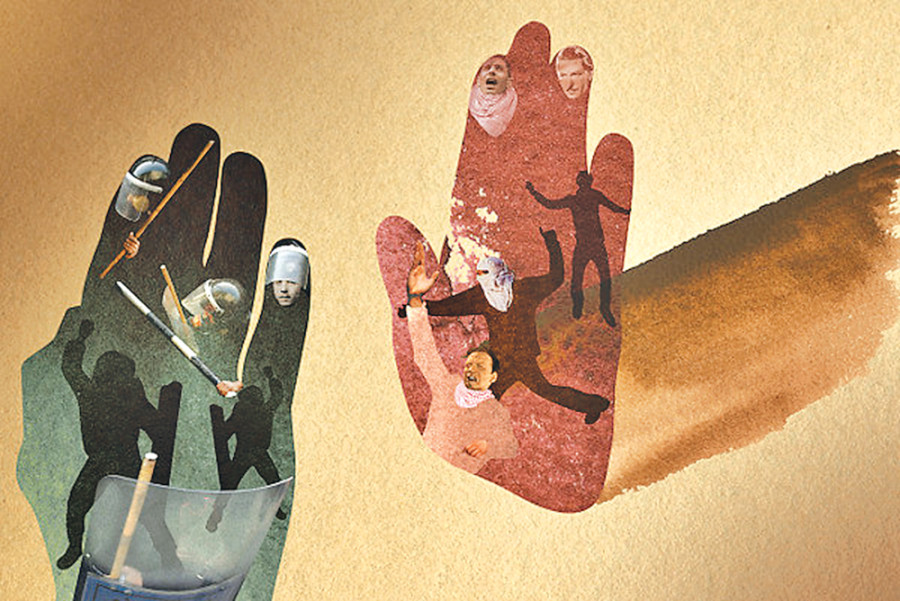Opinion
Initiate the investigation
The state should probe the killings that took place during the Tarai unrest, all of them
Randhir Chaudhary
The Asian Human Rights Commission (AHRC) and the Tarai Human Rights Defenders Alliance (THRDA) have released a report entitled Nepal Protest and Repression with a demand that the government immediately form a high-level independent commission to investigate the killings of protesters, bystanders and police personnel during the anti-constitution protests which lasted from August 2015 to February 2016 and took the lives of more than 50 people. The publication of their findings follows the report of Human Rights Watch (HRW).
Recent developments
A dozen leaders associated with the United Democratic Madhesi Front (UDMF) have been arrested in the past month for their alleged involvement in the killing of ASI Thaman Bahadur BK in Mahottari on September 11. During the first hearing of the case at the Mahottari District Court, hundreds of locals gathered outside the court premises shouting slogans against the alleged bias of the state for not probing the killings of protesters and arresting Madhesi leaders without any substantial evidence.
On March 29, the Dhanusha Appellate Court issued a show-cause order in the name of the District Police Office Mahottari in response to a writ of mandamus filed by Indu Yadav, father of Ram Bibek Yadav who was killed by security personnel in Jaleshwor on September 9. The police have promised to appear in court with a written response within 15 days. This is a good effort by the victim’s family to knock on the court’s door.
Reluctance of the state
During the five-month-long protest organised by the UDMF, 55 people were killed. They included both security personnel and demonstrators. According to some rights organisations, 21 among the dead were bystanders. Most of them had been shot above the knee which is a clear breach of Local Administration Law 1971 and international law. We should respect the government’s step to form a probe committee and investigate the Tikapur killings. Arrests were made in connection with the killing of ASI Thaman Bahadur BK too. The government must investigate these cases and punish the guilty, but the question that one is confronted with is why the state is reluctant to investigate the killings of people during the protests throughout Madhes.
Regarding the excessive use of force against the demonstrators, member of the National Human Rights Commission (NHRC) Nepal Mohana Ansari raised the issue at the 31st Session of the Human Rights Council related to the second cycle Universal Periodic Review of Nepal held in Geneva on March 16. Ansari said, “Recently, 55 people including security personnel were killed during the political protests in the Tarai due to dissatisfaction with the new Constitution. The findings of the NHRC show that these killings and injuries were due to an excessive use of force. Thus, I would like to reemphasise that the recommendations for a proper investigation into the excessive use of force and prosecution be accepted. That can ensure justice to the victims.”
All the rights organisations including the NHRC have been demanding an investigation into the killings, but the state has been ignoring all the recommendations mainly because it thinks that the people will forget the issue after some months or years.
Be critical
Regardless of who the guilty are, they should be put behind bars. But, at the same time, all the law enforcement agencies should be adequately cautious while implementing the law. They must think whether the law is being used selectively or impartially. However, Nepal’s security apparatus should not manipulate the criminal investigation system to target certain political or ethnic groups. The arrest of a large number of political leaders in Mahottari for their alleged involvement in the killing of Thaman Bahadur BK appears to be a politically motivated action of the government.
Moreover, political leaders, and more importantly, leaders associated with the UDMF, should play a proactive role in Parliament by demanding that the government set up a probe committee to investigate the killings. If this does not happen, the younger leaders could become radicalised. The recent bullying of the NHRC by the prime minister has unveiled the government’s intention to let human rights violations remain hidden. This action has intensified the legitimacy crisis between the government and ordinary people, which must be stopped. Now it is up to NHRC-Nepal and the government to protect Nepal’s image that it is a human rights-friendly nation. Investigating the killings will also mitigate the current legitimacy crisis between the state and Madhes to some extent.
Chaudhary is associated with the Tarai Human Rights Defenders Alliance




 14.12°C Kathmandu
14.12°C Kathmandu










